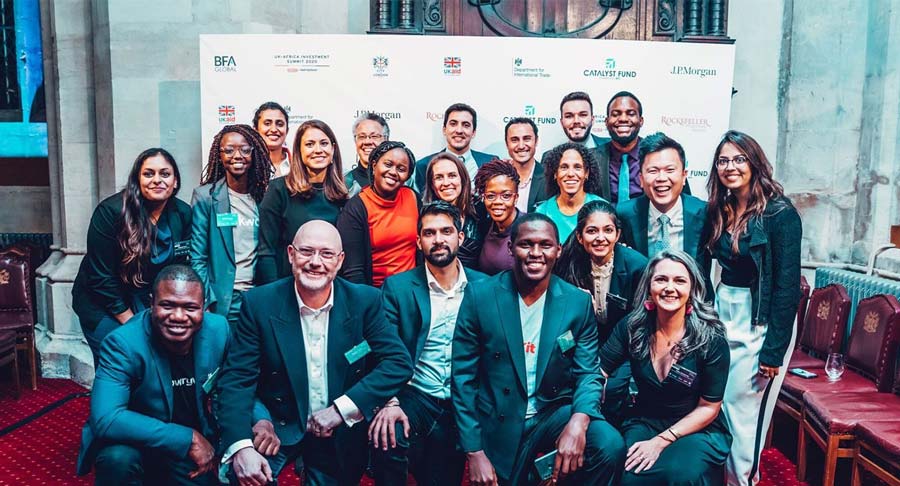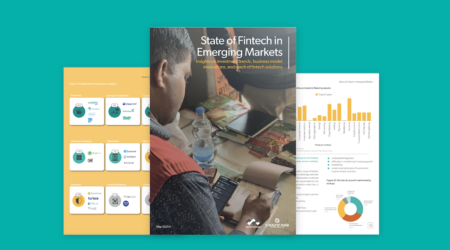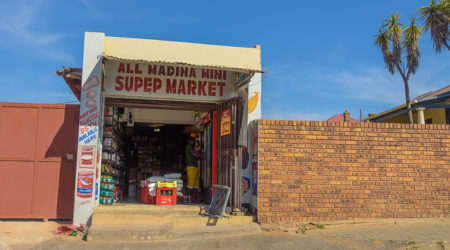Why the Catalyst Fund startup accelerator delivers outsized success

Bespoke support, flexible grants, and sector expertise: why the Catalyst Fund startup accelerator delivers outsized success
Global startup accelerator 500 Startups recently announced a major pivot toward a more flexible and founder-centric acceleration model, recognizing the need to “move away from the one-size-fits-all approach of the past, and towards delivering relevant content, based on each founders’ growth stage and needs, precisely when they’re ready for it.”
At Catalyst Fund, we have long advocated for such an approach. Offering on-the-ground, bespoke support, delivered by experts in the markets where our companies operate, has been core to our model since we launched in 2016, when we pioneered the idea of an accelerator specifically tailored to the needs of inclusive fintech startups in emerging markets.
We hope we’ll see a number of startup accelerators following 500 Startups in developing programs with the flexibility to adapt their offerings to each startup’s individual needs and timing – in particular as we all adjust to the post-COVID-19 reality that will require more remote collaboration.
Last year, after accelerating our first 20 startups, we evaluated the results of our program, noting lessons from our initial success with the wider ecosystem. Early this year we expanded on this work and committed to accelerating 30 additional startups with new funding from UK aid and JPMorgan Chase & Co, with a focus on five key markets and a mandate to accelerate the wider fintech ecosystem to truly enable startups to scale.
A proven model
Catalyst Fund’s approach as a startup accelerator has seen outsized success to date in helping early-stage startups reach product-market fit and access follow-on investments. Like 500 Startups – a long-time partner and member of Catalyst Fund’s Investor Advisory Committee – we recognize how important it is to tailor support to the needs of each startup based on where they are when they join us.
Our program was created to put entrepreneurs first. It combines flexible capital, deep venture building support, 1:1 connections with investors and corporate innovators that can help companies scale, and access to our wider fintech network.
To date, we’ve accelerated 31 companies, and the data shows our approach is working. Compared with startups in other accelerator programs that reported to the Global Learning Accelerator Initiative (GALI), Catalyst Fund portfolio companies have gone on to raise significantly more follow-on funding, and expanded their teams more quickly, to ultimately reach a large total number of underserved customers given their stage.
GAN reports that in 2019, the average funding amount raised per startup in the 12 months following an accelerator program was $547K. At Catalyst Fund, this number is $2.5M on average, with a $14M and two $6M Series A rounds raised in the last year alone. The portfolio has raised $63.2M overall since completing the program. Moreover, all of our startups operate in emerging markets, where funding size is often lower to begin with, and access to capital is more challenging.
Our companies collectively reach over 2M underserved MSMEs and end users with solutions designed specifically to improve their financial health and resilience, and to provide additional revenue opportunities.
Our secret to success: philanthropic capital + tailored venture building support + investor-led sourcing
Our incredible team, partners, and the portfolio founders we work with play an instrumental role in unlocking growth for the businesses and funding, but we believe we’ve also uncovered a few keys to supporting entrepreneurs and ensuring they succeed.
Investor-led sourcing
Early-stage and fintech investors in emerging markets have spent years honing their sourcing process and know how to spot a high potential startup. So rather than trying to reinvent the wheel, we leverage the knowledge of some of the world’s leading emerging markets and fintech investors via our Investor Advisory Committee (IAC) which includes Accion Venture Lab, Quona Capital, Flourish Ventures, 500 Startups, Anthemis and Gray Ghost Ventures.
Each of the six investors in the IAC chooses a high potential startup to nominate for each Catalyst Fund cohort – twice per year. These startups are too early for investment, so IAC members mentor and monitor those startups throughout their time with Catalyst Fund, with an intention to potentially evaluate them for investment post-acceleration.
This means our companies are pre-vetted when they come into our startup accelerator program. We also have visibility into the specific proof points investors are looking to see as they grow, so we can better tailor our venture building support to de-risk all of our companies for future investment.
“It was great to have Catalyst Fund not only identify and develop a financial services offering with Sokowatch but create a company that is highly investable for us, which is exactly what Catalyst Fund was designed to do. We’re super satisfied with the results.” – Monica Brand Engel, Partner at Catalyst Fund IAC member Quona Capital
Flexible grant funding
The Catalyst Fund program is supported by UK aid and JPMorgan Chase & Co., and provides each portfolio company with up to £80,000 in flexible grant capital. We believe philanthropic capital has a significant role to play for early stage startups in the investment continuum, particularly as they struggle to overcome the “valley of death.” We’ve seen this time and time again with our startups, which often credit the grant capital received from Catalyst Fund with keeping the lights on long enough to reach product-market fit and raise institutional capital.
This capital is also fully flexible, meaning founders are free to choose how best to allocate the funds in order to make it to the next stage of funding. For some, that means hiring much-needed talent. For others, that might mean engaging in otherwise-impossible experiments in marketing and customer acquisition.
“We spent the full grant acquiring customers via digital marketing. We acquired 250,000 users, meaning 250,000 users in Chile got their credit report for free for the first time.’’- Jorge Camus, CEO, Catalyst Fund company Destacame
Bespoke venture building support
Every venture building project at Catalyst Fund begins with what we call Sprint 0. This is a diagnostic phase during which we dig into every element of a startup – from their data, to their technology stack, to their finances, to their marketing strategies – and determine where they most urgently need support, and what makes the most sense for us to deliver over the coming months. Furthemore, our focus on a single niche – inclusive fintech in emerging markets – enables our experts to bring deep sectoral knowledge, rather than more generalized startup support.
Following Sprint 0, we put together a detailed venture-building plan and pull in experts as needed to deliver the sprints that follow. These sprints can include anything from customer and market research, to data and technology sprints, UI/UX improvements, marketing and communications workshops, investor readiness, and more. Each plan is tailored to the needs and stage of the particular business and is delivered in-person or remotely by BFA Global experts or our partners.
Our startup acceleration approach is to embed our experts to become fully-fledged members of our startups’ teams (in some cases, our staff continues to serve as interim CTO or CMO for companies in our portfolio). We have seen that bespoke, hands-on technical support is the best way to truly deliver a significant impact on their businesses in a short period of time.
This method provides our companies with solid foundations they can build on, rich insights from customer research, and an understanding of how to keep iterating on what they’ve learned, which is what makes our support effective long after their time in the program has ended.
Our portfolio companies agree. While initially many companies were attracted to the program by the flexible concessionary philanthropic capital to build their products, in exit interviews founders indicated that venture building support is what ultimately brought them the most value, as they can’t access this kind of support in most other programs. For example, 14 of our first 20 startups requested ‘double-down’ support from BFA experts after their acceleration period ended, indicating the value they’ve seen from our work. Six were even willing to pay for this additional support before raising their Series A!
In-country knowledge + deep industry expertise
We work with fintech founders in the markets where they operate and don’t take them away from their customers and their ecosystem. We can do this because the Catalyst Fund startup accelerator is powered by BFA Global, a research, product innovation and strategy consulting firm that works in emerging markets around the world. BFA Global’s team includes many experts based in the countries where Catalyst Fund companies operate. BFA experts have spent years understanding how to build trust among low-income consumers in emerging markets, how to design products for these environments, and how to effectively de-risk fintech companies for investment.
And we’re not just researchers and consultants. Our venture builders are tried and true fintech and startup veterans – including the teams that built FrogTek, one of the first fintech companies serving MSMEs in Mexico, and RemitMas in Colombia; experienced early-stage tech investors in Africa and Asia; former management from MEST Africa, the largest Pan-African startup training program and incubator; veterans of multinational banks and financial corporations; data scientists; full stack technologists, policy and regulatory advisors and more. We regularly draw on our own experiences and insights to help our companies thrive.
Ecosystem acceleration: the network effect
Supporting startups alone is not enough to ensure their success. We also need to accelerate the ecosystem around them – the investors who can support them, the corporate partners who are essential for them to scale, as well as governments and other local ecosystem players who can fill gaps and provide much-needed support.
At Catalyst Fund we’re building networks of global and local investors, corporate innovators and more who are interested in working with our startups and others in the inclusive fintech space, in a collective effort to enable the industry to thrive. We introduce them to our startups on a 1:1 basis to support partnerships that are key to unlocking growth and enabling pathways to scale for many fintech startups.
Our Circle of Investors will grow to over 100 members this year, and members have already made investments into portfolio companies. For example, MercyCorps Ventures, a global social impact investor, invested in Harvesting and Turaco, while Nigeria-based Beta Ventures invested in SmileIdentity. Curated introductions are key to unlocking capital for growth.
“There’s a lot of capital looking for opportunities but few compelling opportunities right now. That’s where capacity building has a role to play. What’s important are catalyzers like the Catalyst Fund, enabling conversations to solve issues across all the moving parts.” – Ike Eze, General Partner, Beta Ventures
Finally, one of our primary goals is to ensure we actively learn from our work with our companies, and distill and present insights that can have an impact on other startup accelerators, companies and stakeholders in the space. We’re not only interested in our companies achieving success and survival, but in our ability to learn something from them about what works and what doesn’t in these environments, to produce proof points and to share insights with the wider inclusive fintech community, in an effort to encourage even more innovation and better reach the underserved.
* * *
Over the next three year, we look to support 30 more startups across Kenya, South Africa, Nigeria, India and Mexico and we will dive deeper into ecosystem acceleration to build the networks of support our inclusive fintech startups need. We’ll also be developing a talent network and internship program in an effort to fill talent gaps at the companies we work with – another barrier to their continued growth and success. For us, this is only the beginning, but we’re encouraged by the success we’re seeing with our model and look forward to continuing our work with fintech founders and a larger set of ecosystem players as this sector continues to grow.


